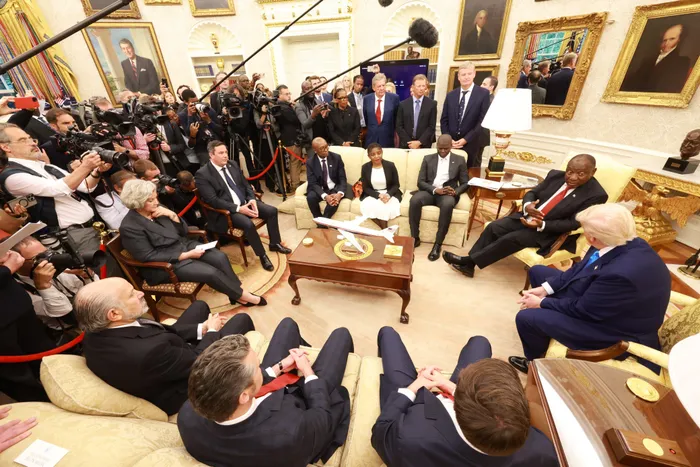‘A complete ambush’: Analysts react to Trump’s surprise attack on 'unprepared' SA delegation to White House

President Cyril Ramaphosa defended South Africa’s land reform laws during a heated White House exchange with Donald Trump, rejecting claims of anti-white violence while reaffirming constitutional protections.
Image: AFP
Agriculture Minister and Democratic Alliance leader John Steenhuisen is facing harsh criticism for what one political analyst called a “weak” performance during a recent high-level meeting at the White House between President Cyril Ramaphosa’s delegation and US President Donald Trump.
Speaking with IOL News, political analyst Dr Imaan Buccus described Steenhuisen as a “weak leader” who lacked the “intellectual muscle” to handle the gravity of the situation.
“Steenhuisen, unfortunately, is a weak leader. I don't think he really has the muscle, intellectual muscle, to be able to handle that situation he was in,” Buccus said.
“I think he was quite honest, you know, quite weak.”
The comments came after Steenhuisen failed to address the controversial topic of land expropriation, which has long been a source of tension between the US and South Africa.
Political observers commented on how unprepared the delegation seemed and as if they were not given any talking points ahead of the meeting.
During the meeting, Trump launched into a sharp criticism of South Africa’s land policies and what he described as the targeting of white Afrikaner farmers.
“We have thousands of people trying to come into our country because they fear they are going to be killed, and their land is going to be confiscated,” Trump said.
“You are taking people’s land away, and those people, in many cases, are being executed. They happen to be white, and most of them happen to be farmers.”
However, Ramaphosa responded firmly, emphasising that South Africa’s Constitution protects land ownership while addressing historic imbalances.
“The South African Constitution protects land ownership,” Ramaphosa said, “and we are seeking to address the injustices of the past within the rule of law.”
White House officials escalated the conversation by playing controversial footage of EFF leader Julius Malema chanting “Kill the Boer,” along with clips of uMkhonto weSizwe party members demanding land redistribution.
In response, Steenhuisen, attending in his capacity as Minister of Agriculture, acknowledged South Africa’s serious crime problem.
“We have a real safety problem in South Africa. I do not think anyone wants to candy-coat that,” he said.
“It requires more policing resources and a new strategy. Certainly, the majority of South Africa's commercial and smallholder farmers really do want to stay in South Africa and make it work.”
Steenhuisen added that the individuals featured in the videos are leaders of minority opposition parties and posed a real threat if allowed into government.
“The reason my party, the Democratic Alliance, chose to join hands with Mr. Ramaphosa’s party was precisely to keep those people out of power,” he said.
“This government, working together, needs the support of our allies around the world to grow our economy and shut the door forever on that rebel getting through the doors of the Union Buildings.”
Still, Buccus argued Steenhuisen missed a critical opportunity to shift the narrative.
“He could have done a lot more with those two or three minutes that he had,” Buccus said.
“He could have made the points more succinctly in a far more cerebral way. We need to dispel this notion that white people are victims. White people are not victims, South Africans are victims. Of all races.”
Meanwhile, COSATU President Zingiswa Losi addressed land expropriation directly, an issue Steenhuisen did not mention.
“I would have loved that the minister addressed the issue of land expropriation and how the policy works,” Losi said.
“Recently, there was a handover of farms where white farmers said they were donating the land. It is a willing buyer, willing seller situation. The government even pays more than the land is worth.”
Buccus agreed Losi made a key point, though he clarified the legal reality.
“She wasn’t completely correct. We do have a law that allows for expropriation without compensation,” Buccus said.
“But in reality, that hasn’t happened. This isn’t Zimbabwe. South Africa is a sophisticated democracy.”
“It was a complete ambush,” said Buccus.
“We don’t expect heads of state to ambush each other like that. And of course, there’s no genocide of white people in South Africa. The real genocide is in Palestine.”
However, Neethling said Ramaphosa was fully prepared and presidential in his response.
“Ramaphosa was composed, confident, and presidential. Everything went very well,” Neethling told IOL News.
“But the issue of crime exposed the fault lines in South Africa. Violent crime is affecting all races.”
Business tycoon Johann Rupert also addressed Trump during the meeting, calling for US support in tackling crime.
“We have too many deaths, but it’s across the board,” Rupert said. “It’s not only white farmers. We need technological help. We need Starlink at every police station.”
Neethling said while the meeting was not confrontational, it served as a wake-up call.
“There was no breakdown in discussions, but the message was clear, much needs to be done in South Africa,” he said.
“The government is not doing well, especially on crime. It’s a national issue that affects everyone.”
simon.majadibodu@iol.co.za
IOL Politics
Related Topics:
